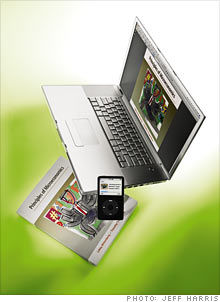Save cash: Download your textbooks
An online startup plans to disrupt the staid world of textbook publishing.
 |
| In 2007, textbook sales reached $3.7 billion and accounted for approximately 15% of the $25 billion book market in the U.S. |
|
|
(Fortune Small Business) -- With today's laptop-toting students downloading podcasts of their lectures to their iPhones, the humble textbook is due for an upgrade - not to mention a discount. Undergraduates spend an average of $1,000 a year on course materials, and textbook costs are rising by an average of 6% annually, according to the National Association of College Stores.
Early next year, those scholars will have another choice. Flat World Knowledge, a startup in Nyack, N.Y., will release its first set of online college textbooks. Students can review them for free or pay as little as $20 to print out a tome or $30 to download an iPod-ready audio file. For a fee, readers will also be able to access interactive features, such as chatting and note sharing.
Two refugees from publishing giant Pearson (PSO)-Prentice Hall - who were on a fast track for promotion - formed Flat World in 2007, snaring $1.5 million in seed money to shake up the $3.7 billion textbook industry.
"We are definitely perceived as disruptive," says co-founder Eric Frank, 39. "The big textbook publishers are aware there's a problem; but whether they have the ability to turn the Titanic around is another story."
Publishers complain that shorter publishing and revision cycles make it harder for them to recoup the $1 million it costs to create the average course book. With used texts now available on eBay (EBAY, Fortune 500) and Amazon (AMZN, Fortune 500) just months after release, publishers have had to accelerate revision cycles, thus hastening the obsolescence of used books. Textbook prices nearly tripled between 1986 and 2004, according to a Government Accountability Office report.
During the past year, 1,500 faculty members from more than 400 U.S. universities signed a petition calling for affordable textbooks, singling out online textbooks as the most 21st-century solution.
"The Web gives us a rare opportunity to rethink the delivery mechanism for textbooks," says Regan Caruthers, director of communications and business development for the California State University system. "If someone does this right, they'll make it better for everybody concerned: the professors, the students and the publishers."
"Everyone agrees that a new digital business model is the way out of the current dilemma," adds Frank Lyman, executive vice president of CourseSmart, an online shopping center for digital textbooks. "The disagreement is about how to get those products into the hands of students and how to price them. The devil is in the access details."
What separates Flat World from such competitors as FreeloadPress.com and Connexions.com is its interactivity and an ad-free environment. While other companies require users to view advertisements before accessing an e-book, Flat World carries none and charges fees, ranging from $20 to $60, only if students create a printout or an audiobook version of the title.
"Most other models still treat digital textbooks as books," says Nicole Allen, textbook specialist for the Public Interest Research Group. "The products that will work are those that treat the textbook as a learning center."
Frank and fellow founder Jeff Shelstad promise that each Flat World book will boast a renowned author, peer review, and top-quality illustration and design. The co-founders say authors will sign a Creative Commons license that allows instructors to modify the work itself - moving chapters around, for example, or inserting specific examples - while ensuring that the original writer retains the copyright.
The company hopes to make money from student-generated study aids fueled by Creative Commons licensing. In a recent Flat World survey of 2,000 college students on Facebook, 60% said they would be happy to pay $19.95 a month for access to online, interactive study guides. And faculty members at universities across the country have been receptive to using Flat World's titles on their syllabi - and even writing for the company.
As of October, the company had signed contracts with 29 authors to write some 20 books. The company's first 10 titles, including Organizational Behavior and Principles of Microeconomics, are scheduled to hit screens between January and June.
"All this activity comes to culmination in 2009," Frank says. "That will be the moment when it either happens or it doesn't." ![]()
Full package: Next Little Thing 2009
Where are they now? See how out past Next Little Things have done.
College costs rise
Is college still worth the price?
-
The Cheesecake Factory created smaller portions to survive the downturn. Play
-
A breeder of award-winning marijuana seeds is following the money and heading to the U.S. More
-
Most small businesses die within five years, but Amish businesses have a survival rate north of 90%. More
-
The 10 most popular franchise brands over the past decade -- and their failure rates. More
-
These firms are the last left in America making iconic products now in their twilight. More












